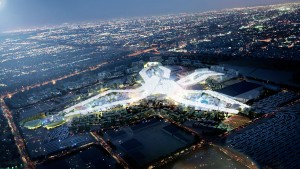The site for Expo 2020 will be transformed into an ecosystem to encourage the growth of the UAE’s knowledge-based economy, according to plans unveiled at Cityscape Global on Monday.
In a keynote speech at the Cityscape conference, Marjan Faraidooni, Expo 2020’s Vice President of Legacy, set out ambitious plans to transform the Expo’s 4.38 square kilometre site into an ecosystem that connects businesses in the transport and logistics, travel and tourism, real estate and education sectors, in a bid to create a thriving knowledge-based economy that contributes to a diversified future for the UAE.
Faraidooni outlined the intentions for the Expo, noting, “Our legacy plans are wide ranging and ambitious. Our Expo will continue to foster innovation, and to create meaningful partnerships that will live beyond 2020 – not only for the UAE, but for the region as a whole,” she said.
Ms. Faraidooni added that plans call for Expo 2020 Dubai to target its investment to deliver a long lasting legacy from the Expo site. “We have spent the past year working on developing our master plan, specifically to create a platform for the future. Over 80% of our investments will be retained following the event. This includes the infrastructure, as well as the cutting edge technologies, and the roads and public transport systems put in place to host the Expo. We intend to build on those physical and virtual platforms to create an ecosystem that lives through the legacy.
“We have dedicated considerable effort towards identifying how we could develop a place that will continue to attract everyone: businesses, students, and workers. It will be a place where people will continue to learn and benefit from the plans and investment being made now,” she noted.
Expo 2020 Dubai’s theme is ‘Connecting Minds, Creating the Future’. The theme represents the belief that progress happens when people and ideas come together in new ways. And this theme celebrates the power of ideas, from anyone, to improve the lives of everyone. This is the guiding principle that lies behind all of Expo 2020’s activities.
Expo 2020 Dubai’s legacy plans are the product of over two years of research and development, following the successful bid to host the mega event in November 2013. Officials from the Expo organisers have looked closely at the UAE’s national strategic priorities, and the planning for other mega events, including the London 2012 Olympic and Paralympic Games, and the Lisbon Expo in 1998. Both events stimulated investment which resulted in the successful regeneration of rundown inner-city areas.
Expo 2020 Dubai will, in contrast, be a driver for the development of an entirely new quarter within the Dubai South district.
Expo’s ecosystem strategy uses physical proximity and an enabling environment to create competitive advantages; most importantly being the access to leading edge skills and capabilities. Expo officials believe that the merging of industries with related technologies will create a centre of excellence that draws in other related companies, enabling wider collaborations and innovations.
Additionally, Expo’s legacy planners have identified four high priority strategic industries: education, transport and logistics, travel and tourism, and real estate. These sectors form the backbone of the current UAE economy, and are industries that have a major role to play in the nation’s ongoing economic diversification.
As part of the legacy plan, Expo has explored how technologies, including augmented reality, big data and the internet of things, could transform these industries. Expo has also identified education and cultural initiatives to complement the ecosystem envisaged by Expo organisers.
Over 80% of the Expo site will be reused or redesigned in the legacy phase. The theme districts – which will host the majority of the country pavilions – will become collaborative work spaces to house companies of all sizes, along with social and cultural institutions.
Source : WAM News Agency












